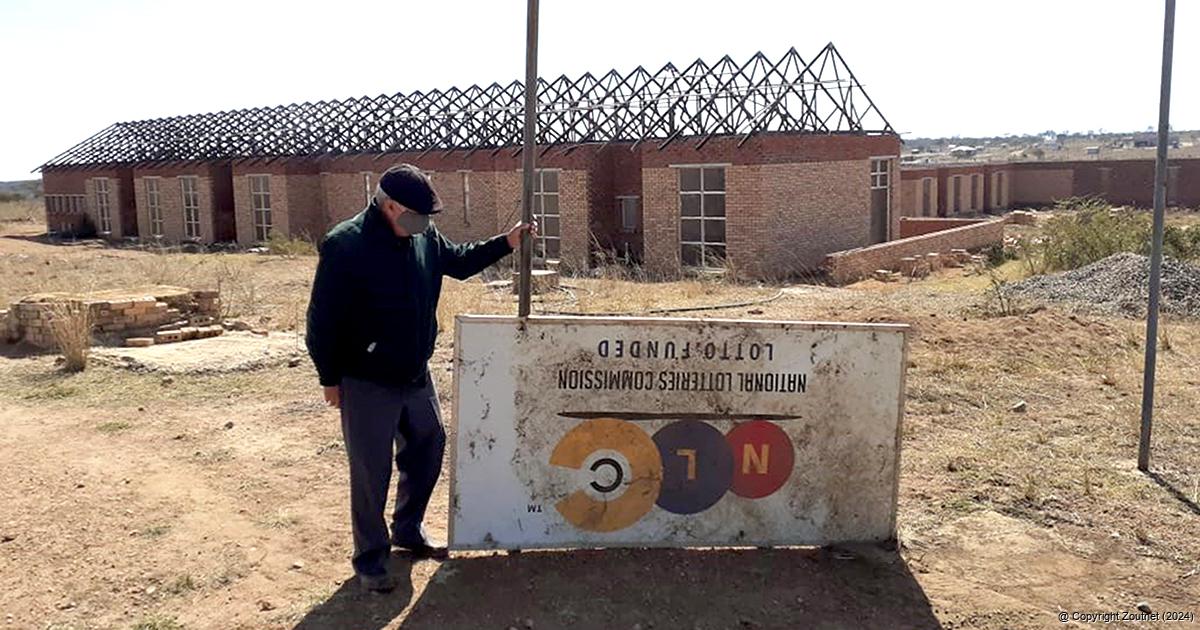

ADVERTISEMENT:

August 2020 - The late Frans van der Merwe stands next to the fallen sign board in front of the deserted buildings.
Maila's 'old-age home' exposes web of lies and deceit at Lottery
News - Date: 12 March 2022
An abandoned National Lotteries Commission (NLC) project at Maila village, about 30 kilometres southeast of Louis Trichardt, serves as a living monument of how poor communities are exploited to fuel the greed of the corrupt in society.
The project also exposes a web of lies and deceit that appear to be an integral part of many multimillion-rand NLC-funded infrastructure projects.
Maila village is one of six NLC old-age home projects, funded to the tune of around R150 million. None of them have been completed or are operational - and several, like the one at Maila village, have been abandoned and left to the elements to rot.
Last week, the Special Investigation Unit (SIU) reported to Parliament’s Trade, Industry and Competition Portfolio Committee on an investigation that began in November 2020 when President Cyril Ramaphosa signed a proclamation authorising the SIU to probe alleged corruption at the NLC.
With just 12 of 50 investigations completed, the SIU has already identified R300 million in Lottery funds that have allegedly been misappropriated, SIU head Advocate Andy Mothibi told MPs.
The SIU investigation was prompted by ongoing reports involving dozens of dodgy projects funded by the NLC. The Limpopo Mirror, along with online publisher GroundUp, has exposed many projects where tens of millions of rands never ended up being used for the intended purpose.
Although not mentioned by name, the Maila village project was highlighted in the SIU’s presentation last Wednesday. Mothibi told the parliamentary committee that almost R23 million earmarked for this project had been paid to a “hijacked” non-profit organisation (NPO) to manage the project.
After the money was received, R4 million was paid to attorneys handling a property transaction for a former NLC board member. This money, along with payments from other NLC beneficiaries, were later used to pay for a property in Wonderboom, Pretoria. “The remainder of the R22 578 350 loot was transferred to a company owned by one of the hijackers. The funds were laundered from his company to other companies linked to himself and those of the family of the senior official of NLC,” Mothibi said.
When the legitimate members of the NPO found out that their organisation had been hijacked and used to apply successfully for NLC funding, they reported this to the NLC. However, instead of reporting the matter to the police, the NLC arranged a meeting between the legitimate members [of the NPO] and the hijackers “to try and resolve the issues amicably”, Mothibi said.
“Instead of opening a criminal case against the hijackers and recovering the money, [the] NLC opted to grant further funding of R7 829 353.00 to the legitimate members of [the NPO],” said Adv Mothibi.
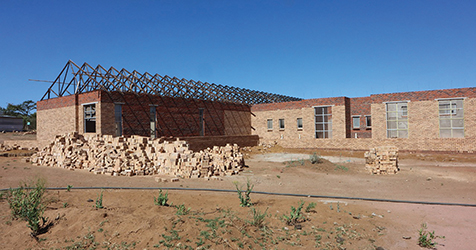 |
| November 2019 - The site is abandoned, but some face bricks are still stacked on the side. |
The SIU presentation managed to fill in some of the gaps in a story that Limpopo Mirror has been pursuing for several years. We first visited the abandoned building site in November 2019. More than a year of digging was necessary before the first story exposing the corruption in this project was published in January 2021.
Since the first articles on dodgy NLC projects appeared in November 2017, the NLC has lambasted GroundUp and Limpopo Mirror, describing their articles as “unbalanced”, “slanted and biased” and “littered with half-truths and supposition”. The NLC also resorted to personal attacks on the journalists involved.
The SIU’s report to Parliament, however, has vindicated our reporting and proven that our shining a light on the nefarious deeds of what appears to be an organised crime syndicate operating with the assistance of senior NLC officials has finally borne fruit.
Let us build an old-age home
The idea to build an old-age home in a remote Limpopo village appears to have originated around 2016. This was a year after an amendment to the Lotteries Act that allowed the NLC to not necessarily wait for applications from organisations that wanted to change the world for the better, but to be proactive instead. It allowed the minister or the NLC, in consultation with its board, to identify worthy projects to fund.
In 2017, the NLC embarked on several infrastructure projects, which included six old-age homes, including the one at Maila village. Why this decision was taken to build old-age homes in areas where such a concept is totally alien, has never been explained.
The NLC’s first challenge was to find a suitable NPO to drive the project. For the Maila village project, a Soshanguve-based co-operative society (co-op), Mushumo Ushavha Zwanda (Mushumo), was handpicked. This was the first of many strange decisions that the NLC has refused to explain.
Mushumo was clearly dormant and non-compliant in its statutory reporting to the Department of Social Development when the NLC paid the first tranche of R20 million into its account in October 2017.
Mushumo was registered as an NPO on 18 May 2004. In October 2011, the entity was also registered as a co-op, with nine founding members and three directors, namely Nomsa Maria Mathebula, Musandiwa Leonard Sidimela and Elizabeth Nenselwa Sono.
The records of the Company and Intellectual Property Commission (CIPC) show that no activity has taken place since 2011. No annual reports have been filed and no change in directorship was recorded. How the entity managed to submit two years’ annual financial statements to the NLC, which is a prerequisite for receiving such a large grant, is a mystery.
Apart from the lack of activity, the NPO also did not have an unblemished record. A few years earlier, in 2013, Mushumo received a $50 000 grant from the United Nations Development Fund’s Small Grants Programme (SGP) for a waste-management project. The project was terminated after less than a year, following a site visit by the UNDP representatives. By then, the NPO had already received $45 000 (R458 550), according to the SGP’s national coordinator, Ms Anele Moyo. “[The project] was unfortunately terminated in Nov 2014 due to theft of equipment purchased to ensure successful implementation of the project and abandonment of project activities by the team,” she said.
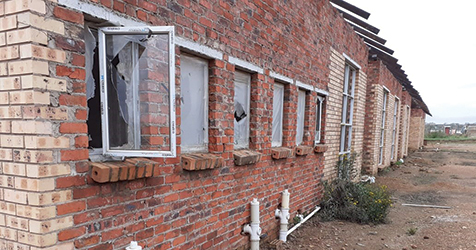 |
| March 2020 - By this time some window panes were still unbroken. This did not last very long. |
Here is R4 million for you …
When the NLC paid R20 million into the bank account of Mushumo on 5 October 2017, the SIU said, the NPO had already been hijacked. One of the NPO’s members changed the bank account details without informing the others, Advocate Mothibi told Parliament.
Four days later, on 9 October 2017, R4 million was transferred to attorneys acting in the sale of a property unrelated to the purpose for which the grant had been allocated. The money was paid to attorneys for the account of Vhutanda Investment, of which Dr Alfred Nevhutanda, the former chairperson of the NLC Board, is the sole director. Several other beneficiaries of NLC funding also deposited money into this account. The funds were later used to buy a multimillion-rand property in Pretoria.
Nevhutanda is well-known in the Vhembe District and was a lecturer at Makhado College of Education up until 1998. He received a PhD in education from Unisa in 2000 and a doctorate in music in 2005. He also claims a somewhat controversial professorship awarded to him by the International Eco-energy Academy of Azerbaijan and refers to himself as “Professor” Alfred Nevhutanda.
Among the many boards Nevhutanda serves on and directorships he holds, is Luonde Media Resource Centre. Luonde used to be the holding company of the broadcasting licence for the community radio station Makhado FM. This licence expired in 2018 and Luonde Media is listed as being deregistered. Who now owns the licence for Makhado FM is not clear. Icasa did not respond to questions seeking clarity.
Questions were sent to Nevhutanda by GroundUp, asking him why a beneficiary needed to pay R4 million into an account used to pay for the property. He did not respond.
A home that no-one agreed on
One would expect that, before embarking on a multimillion-rand project using public funds, proper research would be done and all stakeholders consulted. This was clearly not the case with the Maila village old-age home.
One person who believes that the correct procedures were not followed is the local traditional leader, Vhamusanda David Nthabalala. In an interview last week, he said that the people who drove the project had negotiated with the wrong traditional leader. Nthabalala is the senior headman, or vhamusanda, for that section of Maila village. He never gave permission for the land in question to be used for the project and he says neither did the traditional council that oversees such matters.
When Limpopo Mirror visited the site in 2020, our journalists were told that another traditional leader, Vhamusanda Joshua Nthabalala, was involved in the project. Nthabalala told us that they had initially had plans to develop the site, but then “people from Gauteng came and hijacked it”.
“We had plans to fence off the place and seek funding from some provincial and national departments, so that we could build a chicken coop and buy chicken food and medicine,” he said. They had also planned to purchase some cattle. One of the people involved in their initial planning was the then Limpopo MEC for Transport and Community Safety, Ms Mavhungu Lerule-Ramakhanya.
Nthabalala said that the Gauteng people had offered to build a state-of-the-art old-age home that would benefit the local aged. “We had no idea or plan for an old-age home, but we listened to them and thought that they had something new and that it was worth trying, so long as it benefited our people.”
Although the traditional leaders may disagree as to who has jurisdiction over the site, both agree that they would not have opted for an old-age home. And that the local traditional structures had not been involved in the decision-making process and had little to no control over the project.
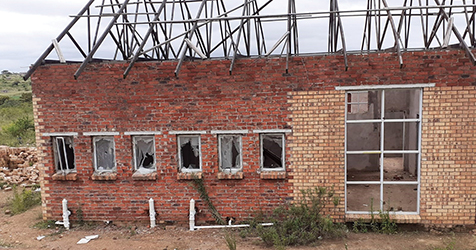 |
| January 2021 - by this time most of the windows were broken. |
Who hijacked whom?
The SIU believes that Mushumo was hijacked and used - with the assistance of officials within the NLC - to siphon off millions in NLC funding.
To understand how this would work, one first needs to understand the type of funding that was approved. The grant was allocated under the proactive funding system of the NLC. This means that the project was initiated by the NLC. The concept was approved by the senior NLC officials and then a suitable NPO needed to be identified to drive the project.
One would expect that the NLC would do proper vetting and look for experienced organisations that have an established track record of managing tens of millions of rands in funding. The least one might expect would be that a local NPO with a good knowledge of the area would be selected. This, however, is not the case, and almost all the proactively funded projects during that period were handed to dodgy or hijacked NPOs. Most of these projects are currently under investigation.
When Limpopo Mirror first enquired about the Maila village project, the NLC’s spokesperson, Ndivhuho Mafela, did not want to provide names or contact details of the NPO’s representatives.
However, Limpopo Mirror managed to track down one of the listed directors, Leonard Sidimela. His name appears in the SGP-funded project that was abandoned in 2014. When questions were sent to him in January 2021, he initially referred all queries to the NLC. When he was pressed to answer and provide clarity to the community, he appeared to have no knowledge of irregularities. “Which irregularities?” he asked, adding that the reporter should “explain that fraud you are talking about to me in writing”.
Sidimela even went as far as accusing the reporter of wanting to write “a front-page, juicy story about that project” and said that “you are being fed lies and you want to be an amplifier of those lies. I will suggest that you relax, we will call you and the people of Limpopo once we have completed and celebrate together,” he said.
The SIU report, however, suggests that Mr Sidimela either has an extremely bad memory, or he has been lying to the “people of Limpopo”. The SIU report also suggests that the NLC’s spokesperson, Mafela, had been very selective with the truth when he responded in January 2021, saying that the delay in finishing the project was “caused by contractual matters between the funded NPO and its contractors”.
In January 2021, the NLC and Sidimela must have been aware of the fraud but were not disclosing this to the community directly affected by the loss. Instead of opening a criminal case against the fraudsters, the NLC arranged for a meeting to “try and resolve the issues amicably”, the SIU told Parliament. The NLC then continued to dump more money into the project.
Where did the money go?
The R16 million that remained after R4 million was paid into the Vhutanda Investment account was most likely channelled to other parties. One of the companies involved with constructing the old-age home was Upbrand Properties. This company is closely linked with Phillemon Letwaba, the chief operating officer of the NLC. At the time, his brother, Johannes Letwaba, was in charge.
When Leonard Sidimela was asked about the involvement of Upbrand in 2021, he denied this. “Again the company that we have appointed is MT Civils, the one you are talking about we know nothing about,” he said.
Sidimela’s denial could be because he was never told what was really happening, or because he was simply lying. In all the correspondence with him, the NLC was included, which means that they chose not to disclose the real facts to the community.
During Limpopo Mirror’s first visit to the site, its reporters found discarded building plans and notes in a shed. On the building plans, the engineers for the project are indicated as PKT Consulting Engineers. This company also links back to Letwaba. Apart from Letwaba, who resigned as director in March 2017, several members of his family, including his wife, are former members of PKT.
However, the most revealing evidence must be the bank statements of Upbrand Properties. These were leaked to reporters and provide a much better picture of what had happened.
The first reference to Maila village is on 11 December 2017, when R8 250 was paid to rent a TLB, probably for site clearing. On 15 February 2018, R20 500 was paid to a company to hire a lowbed truck, presumably to transport some of the machinery to the site. For the next nine months, money flowed in and out of Upbrand’s account to pay for security, wages and general expenses.
Early in 2018, the NLC deposited another R3 million into Mushumo's account, even though the project was not even close to being finished.
Based on the bank statements, a total of R514 485,50 was paid out of Upbrand Properties’ account in the period between December 2017 and November 2018 with a “Maila” reference. In the same period, R304 420 was paid into this account with a similar reference. Upbrand Properties made use of more than one bank account, which makes calculating the exact income and expenditure without having access to all the bank statements impossible.
The SIU believes that the total paid over to the “hijackers” is close to R23 million. “The remainder of the R22 578,350 [loot] was transferred to a company owned by one of the hijackers. The funds were laundered from his company to other companies linked to himself and those of the family of the senior official of [the] NLC,” Adv Mothibi said.
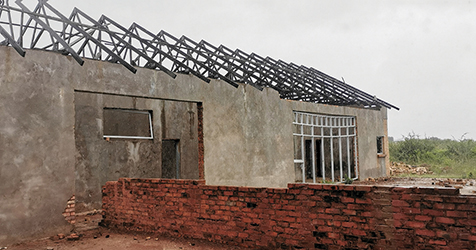 |
| January 2022 - half built walls are starting to fall down and the window sills are coming loose. |
What now?
Determining exactly when the NLC was made aware of the fact that the NPO had been hijacked is very difficult. The Upbrand bank statement entries indicate that payments were made for wages up to the end of November 2018. When people in Maila village were interviewed in 2019, they recalled that construction at the site had stopped earlier that year.
On 21 May 2019, the NLC paid over another R2 989 667,39 to the project. No further construction work followed, and the site was deserted. When the NLC’s spokesperson was asked about the project in January 2020, he said that they had “appointed engineers together with the main contractor (who) are on site today, 21st January 2020, to discuss the technical issues and resumption date for construction. The NLC engineers will then advise on the revised schedule”.
Less than two months later, on 12 March 2020, the NLC paid a further R1 578 375 to Mushumo.
In spite of Leonard Sidimela’s assurance that the work would be completed and the people of Limpopo would “celebrate”, not much is happening at the site where the old-age home is supposed to be built. The roof trusses, after years of being exposed to rain and sun, are rotting away. The site is littered with broken bricks and bricks that were previously on the site have been removed. The windows are broken, and windowsills have been vandalised. Walls are covered in graffiti and the interior is littered with cow dung.
When contacted again two weeks ago, Sidimela still refused to explain what had happened. He used the same excuse that the NLC has been punting for the past year, namely that they are “being investigated” by the SIU and may not say anything. He also indicated that while the investigation is continuing, work at the old-age home will not continue.
The NLC’s spokesperson ignored the request to comment on the project.
Vhamusanda David Nthabalala is not very hopeful that anything can be salvaged. “Perhaps we can now convert the half-built structures into a clinic,” he said. To do that will cost a lot of money - something that is not available to such a poor community.
For now, the people of Maila village can boast of yet another “monument” to greed and corruption and shattered dreams of a better life for the community.

Recent Articles
-

Fed-up Elim residents protest against incomplete D4 road project
27 July 2024 By Thembi Siaga -

Damani Water Project upgraded and handed back to waterless residents
27 July 2024 By Silas Nduvheni -

Opwinding oor opgrawings in noorde van die Krugerwildtuin
27 July 2024 By Pétria de Vaal -

Ben se skielike dood kom as groot skok
26 July 2024 By Andries van Zyl
Search for a story:

ADVERTISEMENT


Anton van Zyl
Anton van Zyl has been with the Zoutpansberger and Limpopo Mirror since 1990. He graduated from the Rand Afrikaans University (now University of Johannesburg) and obtained a BA Communications degree. He is a founder member of the Association of Independent Publishers.

ADVERTISEMENT:

